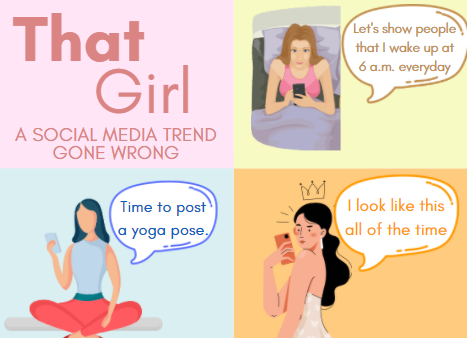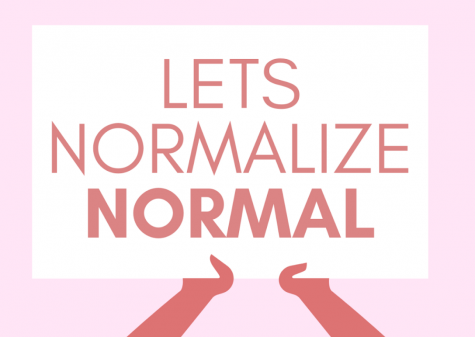When Self-Improvement Becomes An Aesthetic: The ‘That Girl’ Trend
A look at why the seemingly harmless trend is actually affecting the minds of several social media users

The “That Girl” trend. A look at why the seemingly harmless trend is actually affecting the minds of several social media users.
She wakes up at 5 a.m. every morning. She showers every day. She never misses her morning and nightly routines. She exercises five times a week and goes on walks three times a day. She reads for an hour before she goes to bed. She has a perfect grade point average. She journals every night. She is living the perfect life.
She’s just that girl. That girl who seemingly has her life together. That girl with clear skin and smooth, sleek hair. That girl with the perfect outfits and exquisite coffee cups. That girl who doesn’t fail at the chance to post about her picture-perfect lifestyle, yet no one appears to spot when she is in the midst of taking said photo.
This is that girl.
“That girl” isn’t an actual person though. “That girl” is a lie. Because in reality, “that girl” is merely a social media trend that feeds into the idea that girls should be flawless which in turn drives resentment and envy.
Over the past couple of years, the inclination to share one’s life on social media platforms has increased, with social media influencers posting everything from aesthetically posed mirror selfies to their matcha lattes on their Instagram stories. This sudden increase in the urge for visually appealing social media feeds has caused people to care more about their social media presences, and in turn, causes people to adhere to social media for validation and comparison.
The Hypocrisy of the Trend
The problem, however, lies in how this lifestyle is portrayed. Rather than motivating and uplifting others, these influencers instead post their carefully-angled coffees and posed mirror selfies in the gym. The issue is that these girls seem so flawless online which causes other viewers to become jealous and feel as if they’re not living to their greatest potential.
Overall, the trend’s goal is to inspire and motivate. The message behind the trend is very important as a lot of people struggle with maintaining habits or even getting out of bed sometimes, and celebrating small victories is crucial when it comes to mental health.
The problem, however, lies in how this lifestyle is portrayed. Rather than motivating and uplifting others, these influencers instead post their carefully-angled coffees and posed mirror selfies in the gym. The issue is that these girls seem so flawless online which causes other viewers to become jealous and feel as if they’re not living to their greatest potential.
The point of the trend is to inspire, yet explore pages are filled with girls who fit the eurocentric beauty standards and ideal body shape. With girls who have perfect skin and perfectly styled hair. With girls who can afford to buy expensive gym clothes and live in New York apartments that hundreds of teenage girls are probably pinning to their bedroom walls.
The trend is also hypocritical in the fact that it promotes a healthy lifestyle through social media, even though sometimes, self-doubt can come from comparison on social media itself.
Increased Narcissism from Oversharing
According to research conducted by Associate Professor of Psychology at Macquarie University Simon Boag, positive feedback that results from oversharing on social media can lead to an inflated sense of self-importance and influence, or in other definition, narcissism.
Narcissism, described by Oxford Dictionary, is “selfishness, involving a sense of entitlement, a lack of empathy, and a need for admiration, as characterizing a personality type.”
Boag outlines the two different types of narcissism in his report: overt narcissism and covert narcissism. Overt narcissism is the type of narcissism in which a person has a grandiose sense of self-importance and exaggerates personal accomplishments, according to Psychology Today. This type of narcissism makes it more difficult to form and maintain relationships. Covert narcissism on the other hand is harder to spot and therefore more manipulative of the narcissist to utilize. The signs of someone exhibiting covert narcissism include passive-aggressive behavior, envy, lack of empathy, and a strong urge to assist others solely for self-recognition.
The significance of learning about these two narcissistic types, Boag says, is that since diagnosed narcissism is increasing among a number of people, the instant gratification that results from social media feedback could be a potential cause. Furthermore, since covert narcissism is so difficult to spot among people, the true amount of envy and competition on social media is left unseen.
Poor mental health due to comparison to public figures
Boag also referenced American historian Christopher Lasch who wrote about the sudden increase in nature to crave fame or celebrity life in the 1970s. “Thriving on the adulation of the masses, these celebrities set the tone of public life and private life as well,” says Lasch. “The beautiful people … live out the fantasy of narcissistic success, which consists of nothing more substantial than a wish to be vastly admired, not for one’s accomplishments but simply for oneself, uncritically and without reservation.”
This jealousy and comparison can stem from this new desire for celebrity-like fame, such as the Kardashians or Jenners, who post fabricated versions of their lives on their accounts. An example could be how the Kardashians are known to flaunt or publicize their glorious, monochromatic lifestyles, whether it be through an expensive photoshoot at the beach or uploading videos of their kids’ playroom with toys worth thousands of dollars.
Although one can argue that people should be allowed to post what they want and it is easy to block out accounts one doesn’t like from their timeline, it is still very hard to avoid comparing one’s life to these people who can show off their exquisite lifestyles so effortlessly. That also being when they are most likely not as picture-perfect in real life as they seem online.
In an interview by Julia Malacoff at Shape, clinical psychologist Carla Marie Manly, Ph.D. says that a“perfect” social media appearance can cause “those who are not able to achieve this truly impossible level of perfection secretly (or not-so-secretly) [to] feel shamed and defective.”
Normalize Growth and Inspire in a Healthy Manner

It would be more practical if influencers inspired others in their content by incorporating the more “mundane” details of their lives, rather than boasting about the perfect elements of their days, or even just restraining themselves from oversharing. It may not look as “visually-pleasing” on their social media feeds at first, but that is why normalizing it is key. The first step to overcome this problem with this trend is to normalize things that are normal because social media has made it so that people feel insecure about their flaws (or instead, what the internet perceives as flaws).
Your donation will support the student journalists of Patriot High School. Your contribution will allow us to purchase equipment and cover our annual website hosting costs.












yep • Nov 18, 2021 at 10:12 pm
I relateeeee